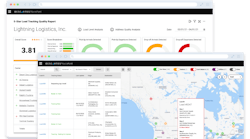Last winter Alexandria, VA, experienced an ice storm that certainly took its toll on many of the neighborhood trees around my house, including the one that seemed to land directly on top of my home. Luckily for me, I had insurance and the damage was minimal to the roof itself—only a few shingles broken and out of place, but zero structural damage and no leaks so everything stayed dry. That being said, when the time came to fix my roof, I did so even though I knew it was a cost that was hard to incur at the time, even with a deductible. The benefits of fixing the roof were certainly justified, though. The same cannot be said for the Federal Motor Carrier Safety Administration. It seems that the FMCSA, after completing its recent study on crash accountability, has decided that the costs do outweigh the benefits of having crash accountability as part of its CSA program. I guess when it comes down to the benefits, it all depends on who you ask.
Let’s look into this a little further because I think we can all agree that there is a difference between a roof on my house and a safety measurement system that basically rates carriers on their operations and safety inspections over the previous two years. My point is that the measurement system is certainly more valuable and has greater ramifications that affect a carrier more than just the rating itself.
First and foremost is a carrier’s customer. CSA effectively changed the relationship between carrier and shipper ever since it first made an appearance. A shipper or manufacturer quite obviously deems it important that its goods get to market, so naturally it often asks to review a carrier’s safety score to make sure it hires the right company.
Inherently, carriers that present their scores to customers are being judged wrongly because the score is not accurate, yet FMCSA has said that the costs to include crash accountability in the equation far outweigh the benefits of doing so. I wonder if any carriers got a vote in that decision.
Secondly, one could almost bet the house that SMS scores will be brought up in post-accident litigation. The lack of accuracy in those scores could certainly portray a carrier as unsafe when, in fact, the opposite would be true. Any and every CSA intervention that is based on scores that are not accurate would almost certainly present themselves, regardless of the accountability of an accident. Again, I reiterate that most carriers did not get a vote when it comes to the costs outweighing the accuracy of the crash accountability data on this one.
My point in all of this is that it is easy to say that the cost of incorporating crash accountability into CSA outweighs the benefits, yet we can also say that FMCSA is not being directly affected by accidents that are inherently not its fault. The carrier that is being measured incorrectly is being affected, much like the bridge collapse over I-75 in Cincinnati. Clearly not the fault of the driver or carrier, yet it certainly has a negative impact on the Crash BASIC score. Unfortunately, there is no “Wrong Place, Wrong Time” BASIC for which that score can fall into. So for now, every carrier across the country maintains a Crash BASIC score with an asterisk because the wherewithal to correct it just does not seem to be affordable in the eyes of the agency.
David Heller, CDS, is director of safety and policy for the Truckload Carriers Assn. He is responsible for interpreting and communicating industry-related regulations and legislation to the membership of TCA. Send comments to [email protected].


